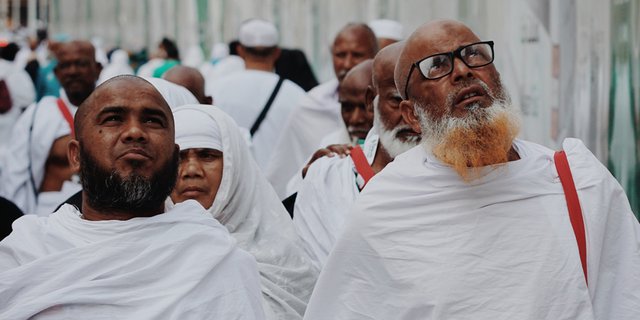Viral Jemaah Haji Makassar Claims to Be Expelled from Hotel in Saudi Arabia, Here are the Actual Facts
Not expelled, the hajj pilgrims were to be moved to Front Taiba Hotel.

Dream – Hajj worship is an obligation for Muslims because it is one of the Five Pillars of Islam. Although it is obligatory, its status varies depending on the ability of each individual.
Hajj worship is required for Muslims who are able to travel to the Holy Land and return to their country. In addition, Muslims must be able to meet the needs of the family members they leave behind.
Not only financially, Muslims who intend to perform hajj must also be physically and mentally healthy. This means that individuals with serious mental illnesses are not obligated to perform hajj even if they are wealthy.
In the context of hajj worship, we are already familiar with the term haji furoda. However, some people may still be unfamiliar with this term. So for Dream friends who are not familiar with the term haji furoda, let's take a look at the full explanation below!
Haji Furoda is a term used to refer to hajj as an individual obligation for those who are capable of performing it. Haji Furoda is also known as Haji Tamattu' or Haji Ifrad.
Specifically, haji furoda is a non-quota hajj worship whose implementation is regulated in Law Number 8 of 2019. Haji furoda is also called haji mujamalah, which is a hajj program that receives a special quota from the Saudi Arabian government.
Legally, the departure of haji furoda is legal and can be done directly without queuing. This is certainly different from haji plus, where the haji plus quota is from the government with higher costs than regular hajj.
Just like hajj worship in general, Haji Furoda also involves a series of predetermined worship during the hajj period, such as wearing the ihram, circumambulating the Kaaba, performing sa'i between the hills of Safa and Marwa, standing at Arafah, stoning the pillars in Mina, and performing tahallul (shaving or shortening hair).
Haji Furoda is a worship that must be performed once in a lifetime by every eligible Muslim. This hajj worship has certain requirements, such as adequate health, physical strength, and financial sufficiency to perform the worship.
Haji Furoda is an opportunity for Muslims to cleanse themselves from sins, seek forgiveness from Allah SWT, and strengthen their spiritual bond with Him. Hajj worship also teaches the values of simplicity, brotherhood, and devotion to Allah.
It is important to note that Haji Furoda is different from Haji Nafilah, which refers to voluntary hajj performed in addition to the obligation of haji furoda. Haji Nafilah is not obligatory, but it is a recommended practice that earns additional rewards.
Haji Nafilah or known as Haji Sunnah, is a voluntary hajj performed as an additional worship outside the obligation of fardh hajj. Haji Nafilah can be performed by individuals who have already performed the obligatory hajj. In short, haji nafilah is the second or third, and so on, hajj pilgrimage.
Although Haji Nafilah does not have the obligatory status like Haji Furoda, performing Haji Nafilah still brings great rewards and opportunities to draw closer to Allah SWT. Through Haji Nafilah, a Muslim can strengthen their relationship with Allah, cleanse themselves from sins, and receive blessings and forgiveness.
However, multiple hajj pilgrimages should be reconsidered by Muslims. This is because the capacity of Masjidil Haram is limited, so each country has a hajj quota. This makes prospective hajj pilgrims have to queue for years, even decades.
Due to complex reasons regarding hajj services, the Indonesian Ulema Council (MUI) issued a fatwa stating that hajj worship is only obligatory once in a lifetime. This is to provide an opportunity for other Muslims to perform the hajj. If one has excess funds, they can allocate them for public and social purposes.
Cobain For You Page (FYP) Yang kamu suka ada di sini,
lihat isinya
Not expelled, the hajj pilgrims were to be moved to Front Taiba Hotel.
Prayer for cutting hair during Hajj, complete with an explanation of the procedure for male and female pilgrims.
Every day, he regularly saves Rp10 thousand so that it can be used to register for Hajj.
This year, Indonesia received an additional quota from Saudi Arabia of 8,000 pilgrims.
The prayer for Sapu Jagat Hari Tasyrik is considered very powerful and has amazing virtues.
The differences between Hajj and Umrah can be seen from the legal status, time, pillars, and obligations within them.
The data is the highest since 2017 within a 14-day period of hajj operation.
This can disturb other Hajj pilgrims who want to worship with devotion.
Salami's Desire to Return and Cancel the Departure to the Holy Land Surprises Officials and Family Members.
The pillars of Hajj are different from obligatory Hajj and the conditions for obligatory Hajj.
Indonesian hajj pilgrims are advised to maintain their health and physical fitness.
He does not refuse if he has to use a wheelchair in the future.